Principles of Mathematical Induction Class 11 Maths NCERT Solutions are extremely helpful while doing your homework. NCERT Solutions for Class 11 Maths Chapter 4 Principles of Mathematical Induction All Exercises were prepared by Experienced LearnCBSE.online Teachers.
Free download NCERT Solutions for Class 11 Maths Chapter 4 Principles of Mathematical Induction Ex 4.1 and Miscellaneous Exercise PDF in Hindi Medium as well as in English Medium for CBSE, Uttarakhand, Bihar, MP Board, Gujarat Board, BIE, Intermediate and UP Board students, who are using NCERT Books based on updated CBSE Syllabus for the session 2019-20.
NCERT Solutions for Class 11 Maths Chapter 4 Principle of Mathematical Induction
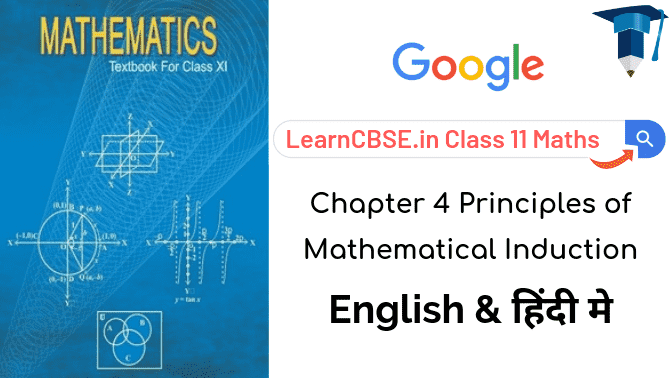
Topics and Sub Topics in Class 11 Maths Chapter 4 Principle of Mathematical Induction:
| Section Name | Topic Name |
| 4 | Principle of Mathematical Induction |
| 4.1 | Introduction |
| 4.2 | Motivation |
| 4.3 | The Principle of Mathematical Induction |
NCERT Solutions for Class 11 Maths Chapter 4 Exercise 4.1
Ex 4.1 Class 11 Maths Question 1:

Ans :
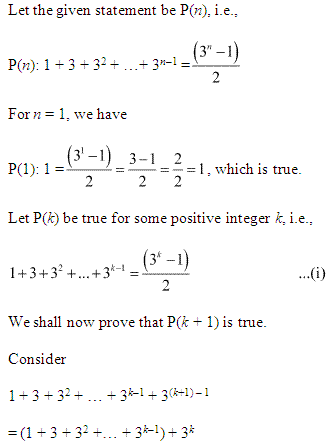
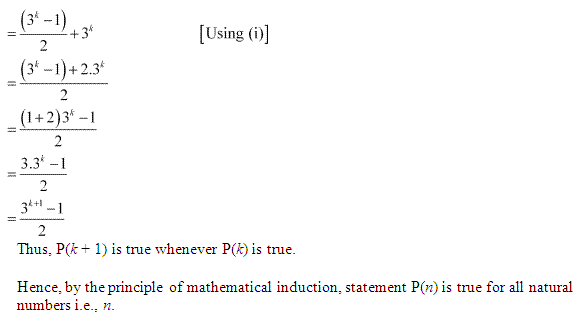
Ex 4.1 Class 11 Maths Question 2:

Ans :
Let the given statement be P(n), i.e.,
P(n) = 1
3
+ 2
3
+ 3
3
+ …………. + n
3
= \(\left(\frac{n(n+1)}{2}\right)^{2}\).
For n = 1, we have
P(1) : 1
3
= 1
= \(\left(\frac{1(1+1)}{2}\right)^{2}=\left(\frac{12}{2}\right)^{2}\)
= 1
2
= 1 which is true.
Let P(k) be true for some positive integer k, i.e.,
1
3
+ 2
3
+ 3
3
+ …………. + k
3
= \(\left(\frac{k(k+1)}{2}\right)^{2}\)
We shall now prove that P(k+1) is true.
Consider 1
3
+ 2
3
+ 3
3
+ …………. + k
3
= \(\left(\frac{k(k+1)}{2}\right)^{2}\)
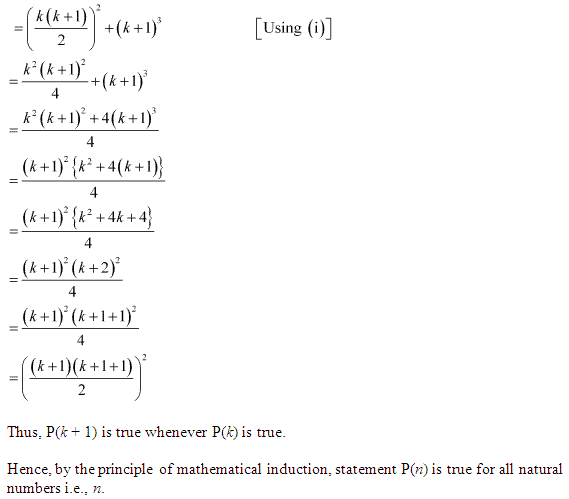
NCERT Solutions For Class 11 Maths(Download PDF)
More Resources for CBSE Class 11
- NCERT Solutions
- NCERT Solutions Class 11 Maths
- NCERT Solutions Class 11 Physics
- NCERT Solutions Class 11 Chemistry
- NCERT Solutions Class 11 Biology
- NCERT Solutions Class 11 Hindi
- NCERT Solutions Class 11 English
- NCERT Solutions Class 11 Business Studies
- NCERT Solutions Class 11 Accountancy
- NCERT Solutions Class 11 Psychology
- NCERT Solutions Class 11 Entrepreneurship
- NCERT Solutions Class 11 Indian Economic Development
- NCERT Solutions Class 11 Computer Science
Ex 4.1 Class 11 Maths Question 3:

Ans :
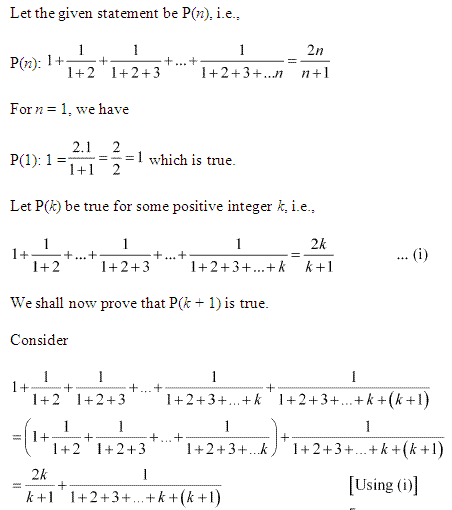
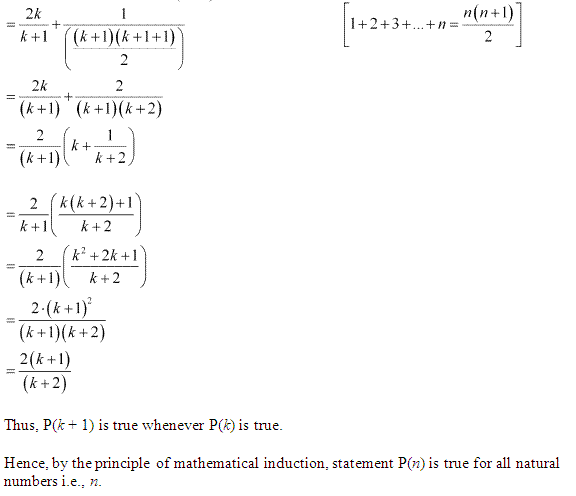
Ex 4.1 Class 11 Maths Question 4:

Ans :
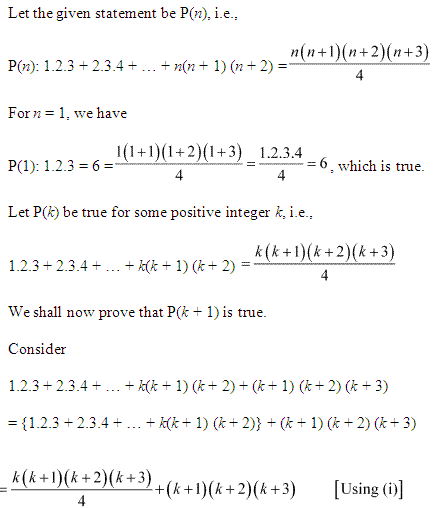
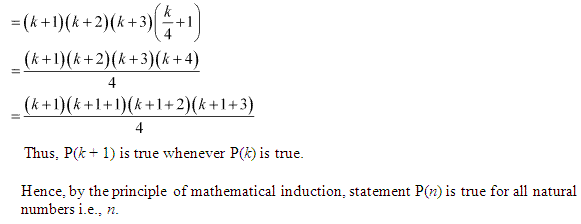
Ex 4.1 Class 11 Maths Question 5:
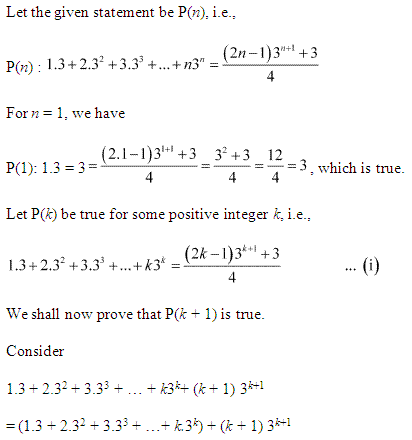
Ans :
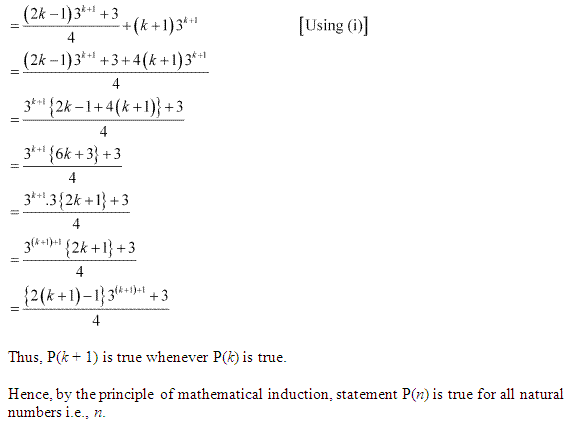
Ex 4.1 Class 11 Maths Question 6:

Ans :
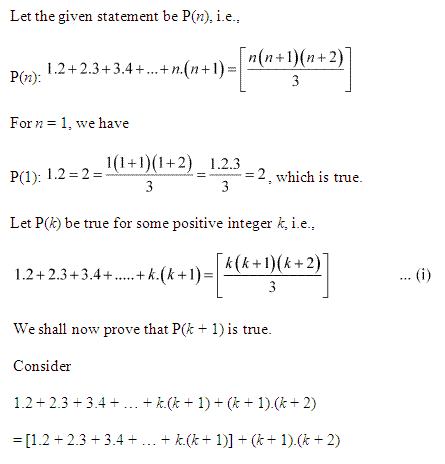
= \(\frac{k(k+1)(k+2)}{3}\) + (k + 1) (k + 2)
= (k + 1) (k + 2) + (\(\frac{k}{3}\) + 1)
= \(\frac{(k+1)(k+2)(k+3)}{3}\)
= \(\frac{(k+1)(k+1+1)(k+1+2)}{3}\)
Thus, P(k+1) is true whenever P(k) is true.
Hence, by the principle of mathematical induction, statement P(n) is true for all natural numbers i.e., n.
Ex 4.1 Class 11 Maths Question 7:

Ans :
Let the given statement be P(n), i.e.,
P(n) : 1 . 3 + 3 . 5 + 5 . 7 + … + (2n – 1) (2n + 1) = \(\frac{n\left(4 n^{2}+6 n-1\right)}{3}\)
For n = 1, we have
P(1) : 1 . 3 = 3
= \(\frac{1\left(4.1^{2}+6.1-1\right)}{3}=\frac{4+6-1}{3}=\frac{9}{3}\) = 3, which is true.
Let P(k) be true for some positive integer k, Le.,
1 . 3 + 3 . 5 + 5 . 7 + ………………. + (2k – 1) (2k + 1) = \(\frac{k\left(4 k^{2}+6 k-1\right)}{3}\) ……………(i)
We shall now prove that P(k + 1) is true.
Consider (1 . 3 + 3 . 5 + 5 . 7 + … + (2k – 1) (2k + 1) +{2 (k + 1) – 1} {2(k + 1) + 1}
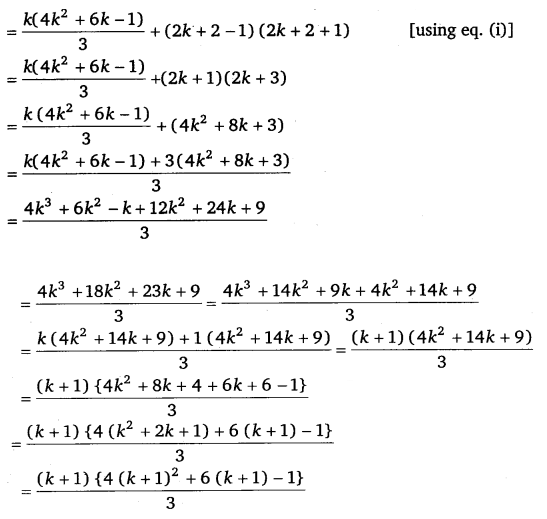
Thus, P(k + 1) is true whenever P(k) is true.
Hence, by the principle of mathematical induction, .statement P(n) is true for all natural numbers i.e., n.
Ex 4.1 Class 11 Maths Question 8:
![]()
Ans :
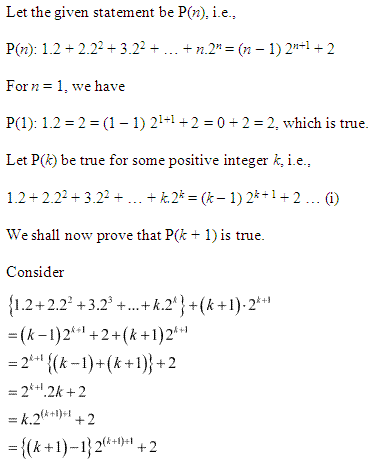

Ex 4.1 Class 11 Maths Question 9:

Ans :
Let the given statement be P(n), i.e.,
P(n) : \(\frac{1}{2}+\frac{1}{4}+\frac{1}{8}+\ldots+\frac{1}{2^{n}}=1-\frac{1}{2^{n}}\)
For n = 1, we have
P(1) : \(\frac{1}{2}\)
= 1 – \(\frac{1}{2^{1}}\)
= \(\frac{1}{2}\), which is true.
Let P(k) be true for some positive integer k, i.e.,
\(\frac{1}{2}+\frac{1}{4}+\frac{1}{8}+\ldots+\frac{1}{2^{k}}=1-\frac{1}{2^{k}}\)
We shall now prove that P(k + 1) is true.
Consider \(\left(\frac{1}{2}+\frac{1}{4}+\frac{1}{8}+\ldots+\frac{1}{2^{k}}\right)+\frac{1}{2^{k+1}}\)
= \(\left(1-\frac{1}{2^{k}}\right)+\frac{1}{2^{k+1}}\)
= \(1-\frac{1}{2^{k}}+\frac{1}{22^{k}}=1-\frac{1}{2^{k}}\left(1-\frac{1}{2}\right)\)
= \(1-\frac{1}{2^{k}}\left(\frac{1}{2}\right)=1-\frac{1}{2^{k+1}}\)
Thus, P(k + 1) is true whenever P(k) is true.
Hence, by the principle of mathematical induction, statement P(n) is true for all natural numbers i.e., n.
Ex 4.1 Class 11 Maths Question 10:

Ans :
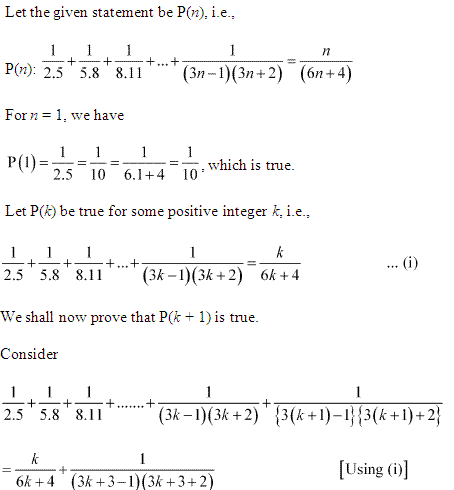
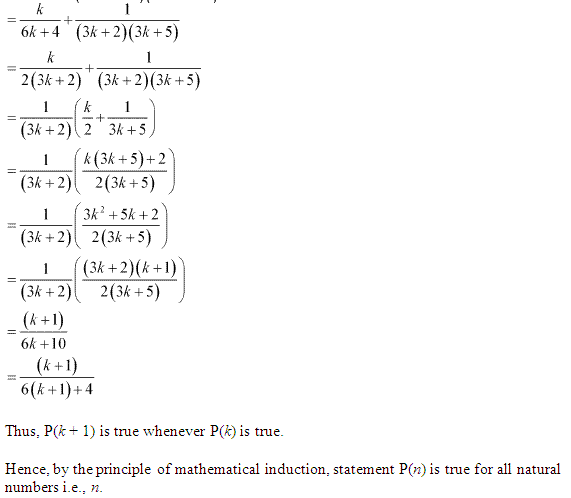
Ex 4.1 Class 11 Maths Question 11:

Ans :
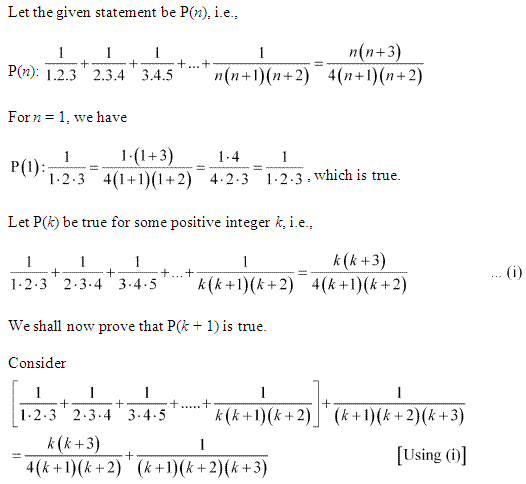
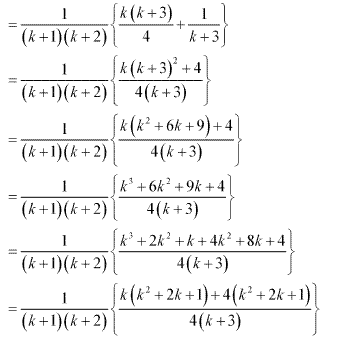
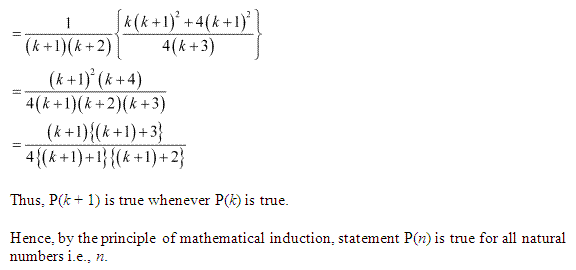
Ex 4.1 Class 11 Maths Question 12:

Ans :
Let the given statement be P(n), i.e.,
P(n) : a + ar + ar 2 + …………… + ar n – 1 = \(\frac{a\left(r^{n}-1\right)}{r-1}\)
For n = 1, we have
P(1) : a = \(\frac{a\left(r^{1}-1\right)}{(r-1)}\) = a, which is true.
Let P(k) be true for some positive integer k, i.e.,
a + ar + ar 2 + …………… + ar k – 1 = \(\frac{a\left(r^{k}-1\right)}{r-1}\) …………..(i)
We shall now prove that P(k + 1) is true.
Consider
a + ar + ar
2
+ …………… + ar
k – 1
} + ar
(k + 1) – 1
= \(\frac{a\left(r^{k}-1\right)}{r-1}\) + ar
k
[Using eQuestion (i)]
= \(\frac{a\left(r^{k}-1\right)+a r^{k}(k-1)}{r-1}\)
= \(\frac{a\left(r^{k}-1\right)+a r^{k+1}-a r^{k}}{r-1}\)
= \(\frac{a r^{k}-a+a r^{k+1}-a r^{k}}{r-1}=\frac{a r^{k+1}-a}{r-1}\)
= \(\frac{a\left(r^{k+1}-1\right)}{r-1}\)
Thus, P(k + 1) is true whenever P(k) is true.
Hence, by the principle of mathematical induction, statement P(n) is true for all natural numbers i.e., n.
Ex 4.1 Class 11 Maths Question 13:

Ans :
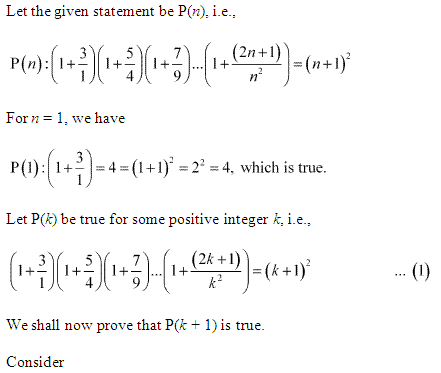
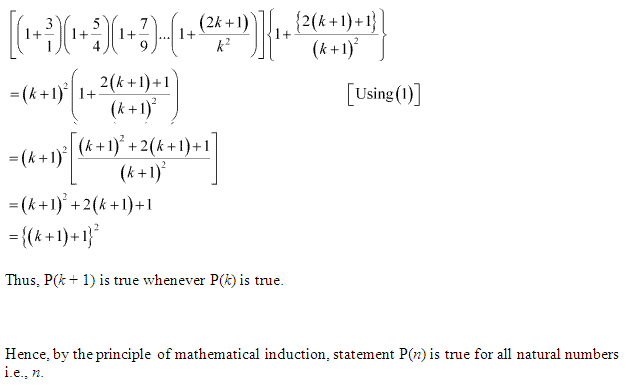
Ex 4.1 Class 11 Maths Question 14:

Ans :
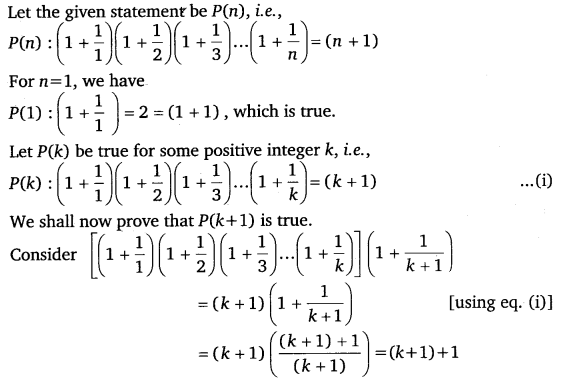
Thus, P(k + 1) is true whenever P(k) is true.
Hence, by the principle of mathematical induction, statement P(n) is true for all natural numbers i.e., n.
Ex 4.1 Class 11 Maths Question 15:
Prove the following by using the principle of mathematical indcution for all n ∈ N:
1
2
+ 3
2
+ 5
2
+ … + (2n – 1)
2
= \(\frac{n(2 n-1)(2 n+1)}{3}\)
Ans :
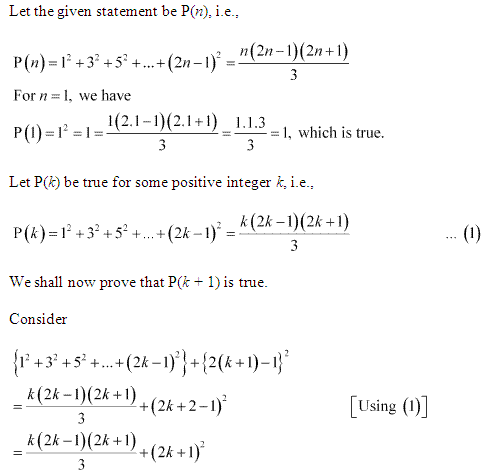
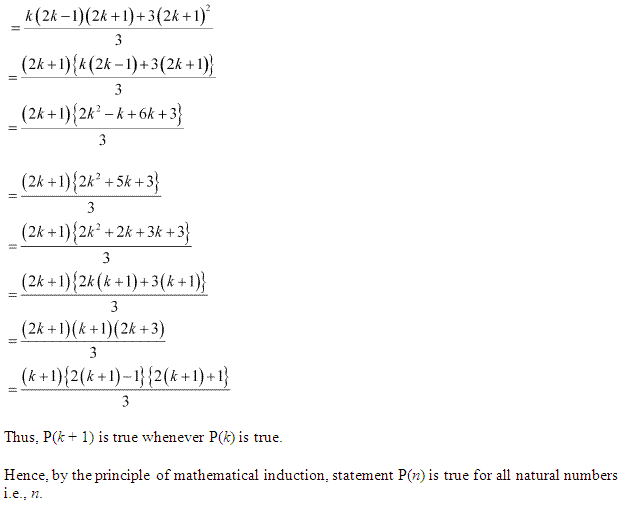
Ex 4.1 Class 11 Maths Question 16:

Ans :
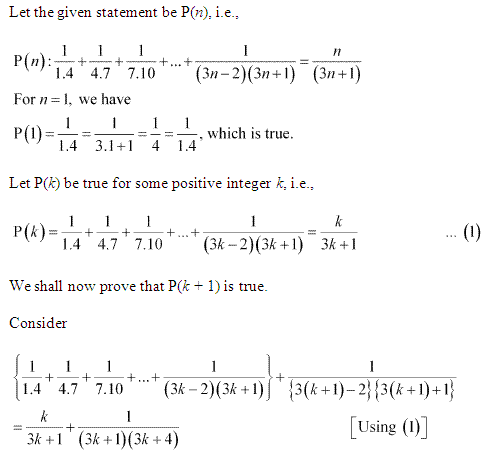
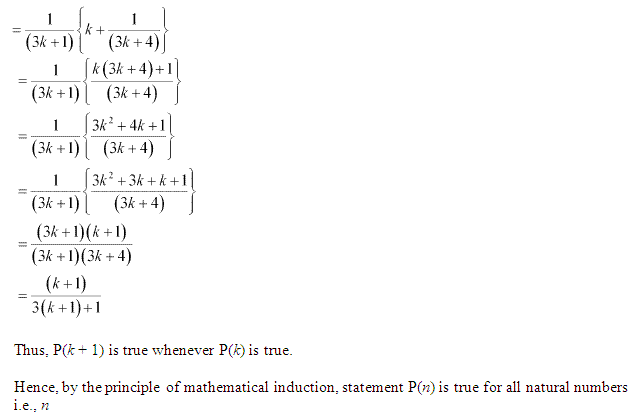
Ex 4.1 Class 11 Maths Question 17:

Ans :
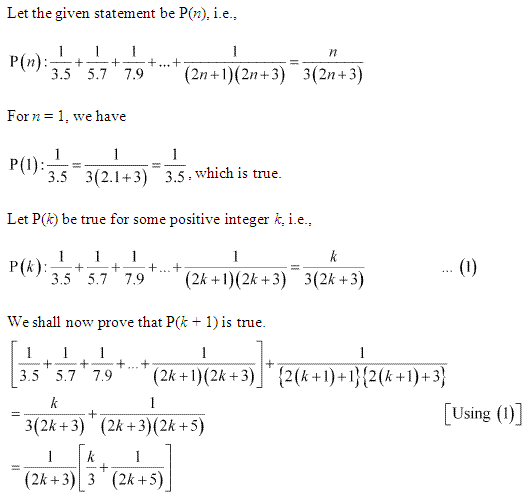
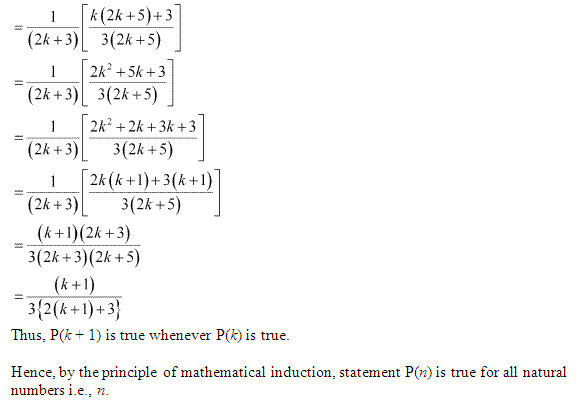
Ex 4.1 Class 11 Maths Question 18:

Ans :
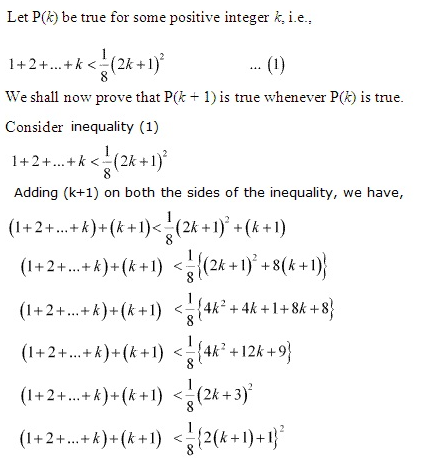

Ex 4.1 Class 11 Maths Question 19:
![]()
Ans :
Let the given statement be P(n), i.e.,
P(n) : n (n + 1) (n + 5) which is a multiple of 3.
It can be noted that P(n) is true for n=l since 1 (1 + 1) (1 + 5) = 12, which is a multiple of 3.
Let P(k) be true for some positive integer k, i.e., k (k + 1) (k + 5) is a multiple of 3.
∴ k (k + 1) (k + 5) = 3m, where m ∈ N ……………….(i)
We shall now prove that P(k + 1) is true whenever P(k) is true.
Consider (k + 1) {(k +1 ) + 1} {(k + 1) + 5}
= (k + 1) (k + 2) {(k + 5) + 1}
= (k + 1) (k + 2) (k + 5) + (k + 1) (k + 2)
= {k (k + 1) (k + 5) + 2 (k + 1) (k + 5)} + (k +1) (k + 2)
= 3m + (k + 1) {2 (k + 5) + (k + 2)}
= 3m + (k + 1) {2k +10 + k + 2}
= 3m + (k + 1) (3k + 12)
= 3m + 3 (k + 1) (k + 4)
= 3 {m + (k + 1) (k + 4)}
= 3 × q, where, q = {m + (k +1) (k + 4)} is some natural number.
Therefore, (k +1) {(k +1) +1} {(k +1) + 5} is a multiple of 3.
Thus, P(k + 1) is trtie whenever P(k) is true.
Hence, by the principle of mathematical induction, statement P(n) is true for all natural numbers i.e., n.
Ex 4.1 Class 11 Maths Question 20:
![]()
Ans :
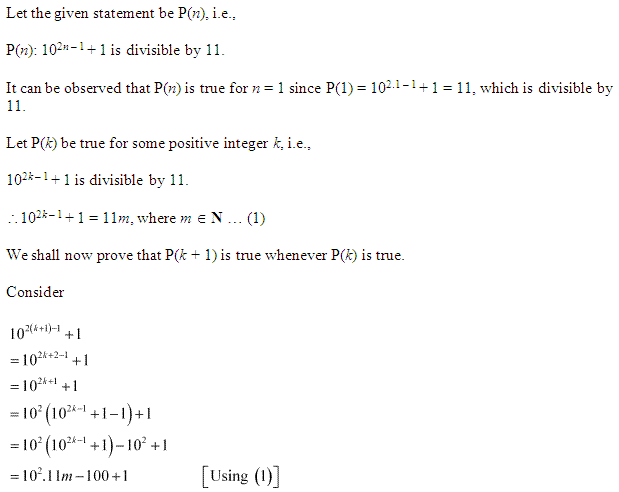

Ex 4.1 Class 11 Maths Question 21:
![]()
Ans :
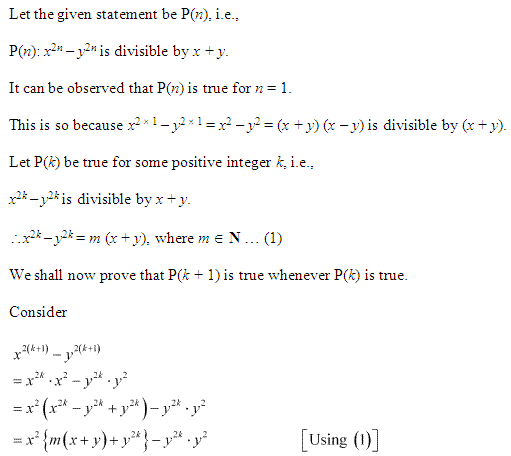
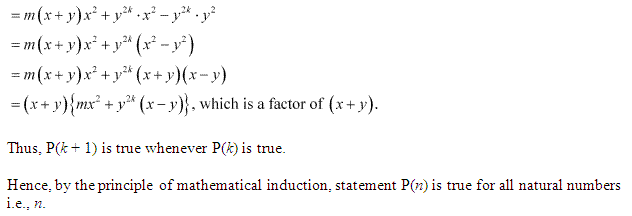
Ex 4.1 Class 11 Maths Question 22:
![]()
Ans :
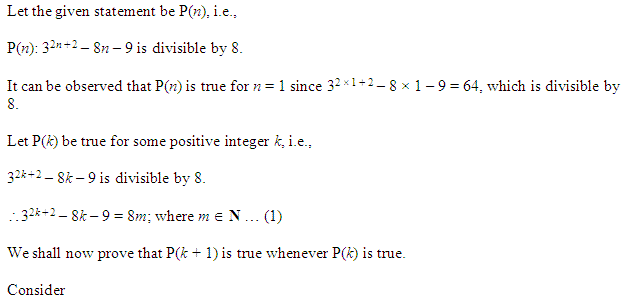
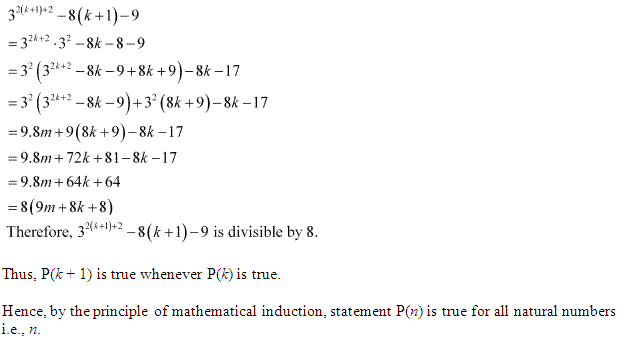
Ex 4.1 Class 11 Maths Question 23:
![]()
Ans :
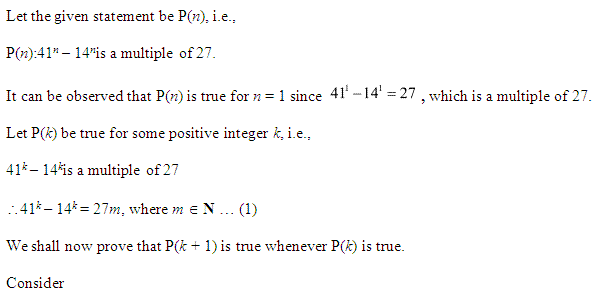
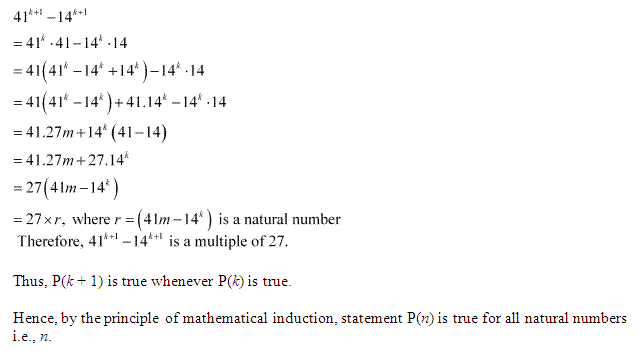
Ex 4.1 Class 11 Maths Question 24:

Ans :

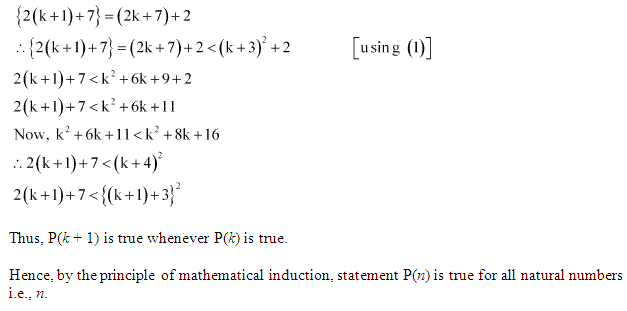
Prove the following through the principle of mathematical induction for all values of n, where n is a natural number.
1) 1 + 3 + 3² + … . + 3 n-1 =\(\frac { { (3 }^{ n }-1) }{ 2 } \)
2: 1³ + 2 ³ + 3 ³ + … … + n ³ = \({ (\frac { n(n+1) }{ 2 } ) }^{ 2 }\)
3: \(1+\frac { 1 }{ 1+2 } +\frac { 1 }{ 1+2+3 } +……+\frac { 1 }{ 1+2+3+…+n } =\frac { 2n }{ n+1 } \)
4: 1.2.3 + 2.3.4 + … + n ( n + 1 ) ( n + 2 ) = \(\frac { n(n+1)(n+2)(n+3) }{ 4 } \)
5: 1.3 + 2. 3 2 + 3.3 3 + … + n . 3 n
NCERT Solutions for Class 11 Maths Chapter 4 Principle of Mathematical Induction Hindi medium Ex 4.1
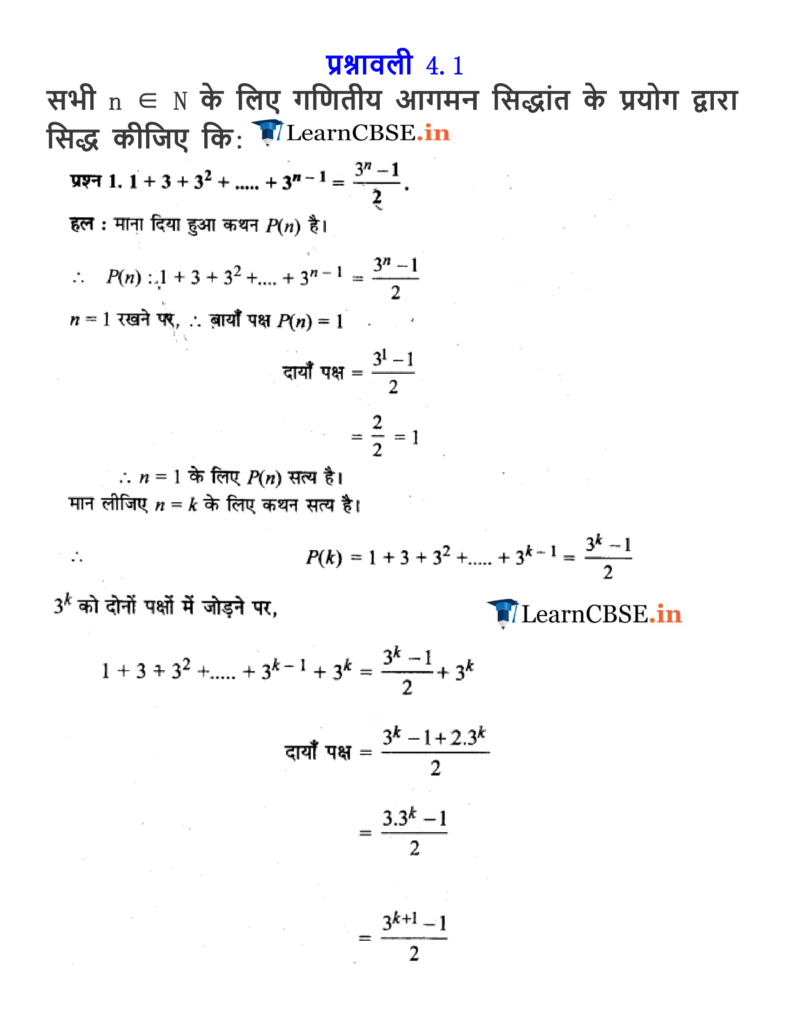
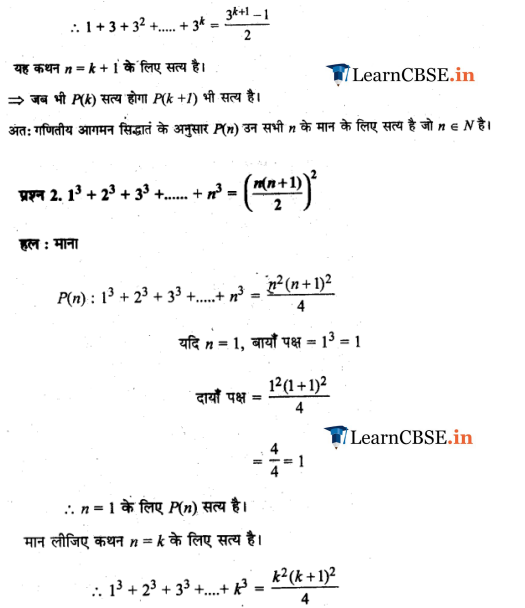
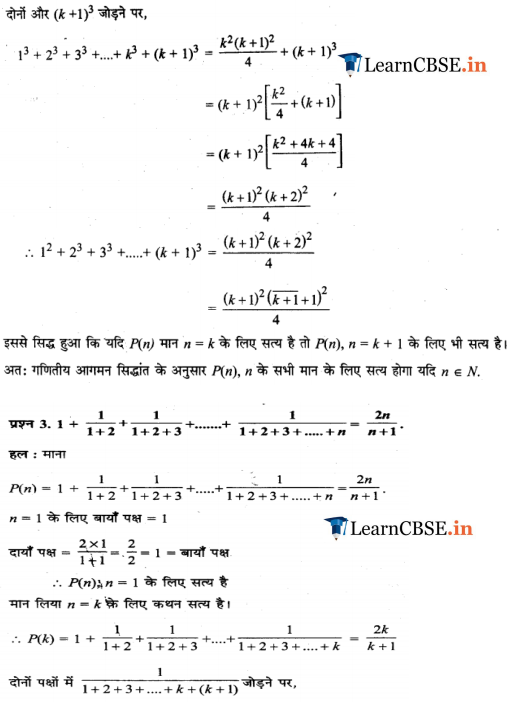
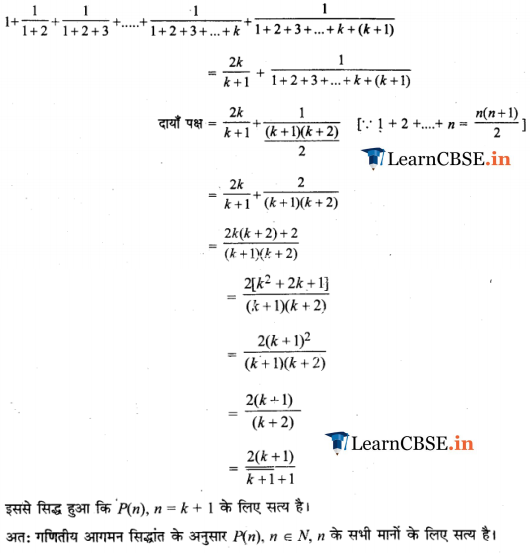
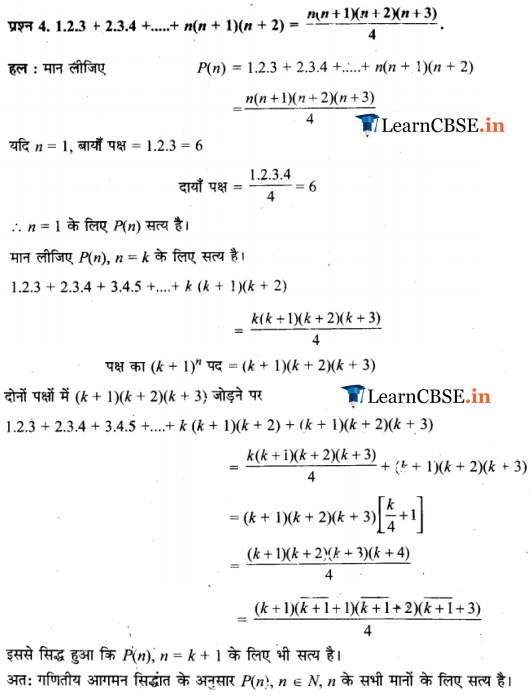
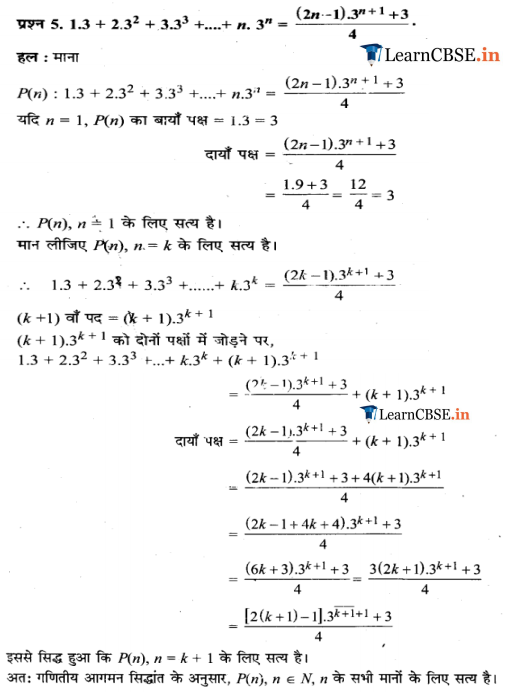
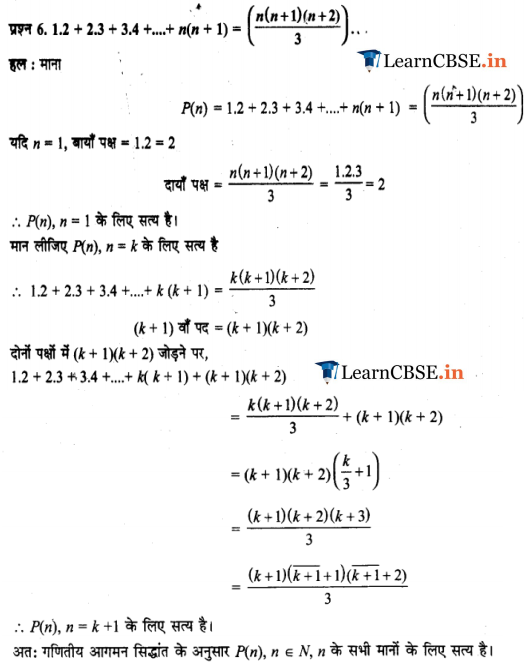
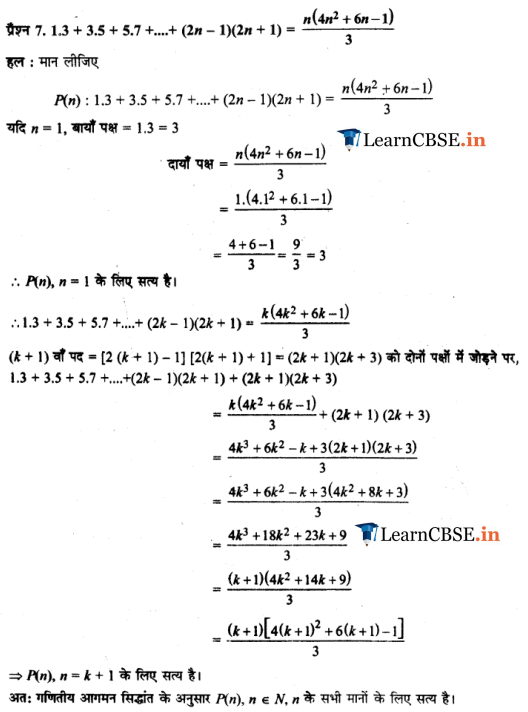
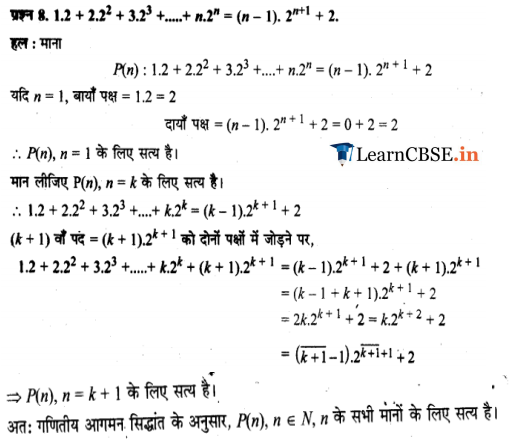
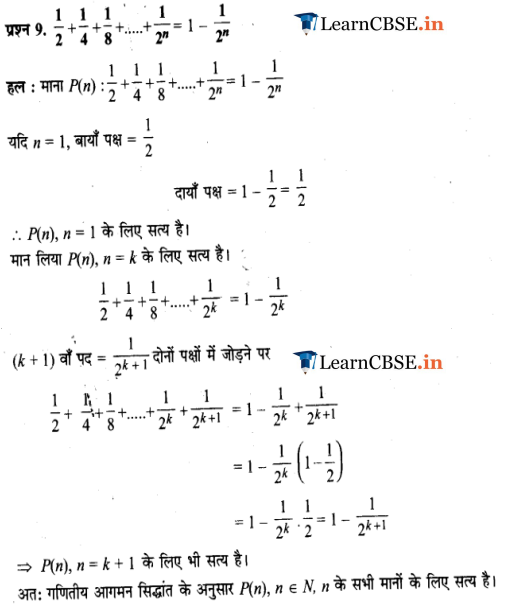
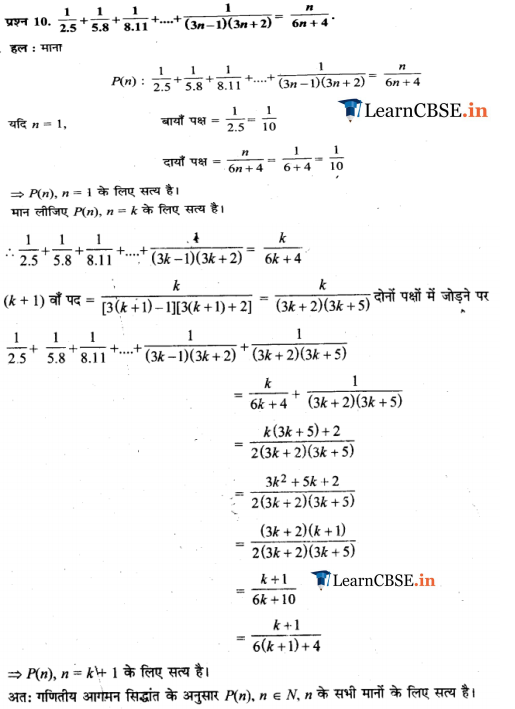
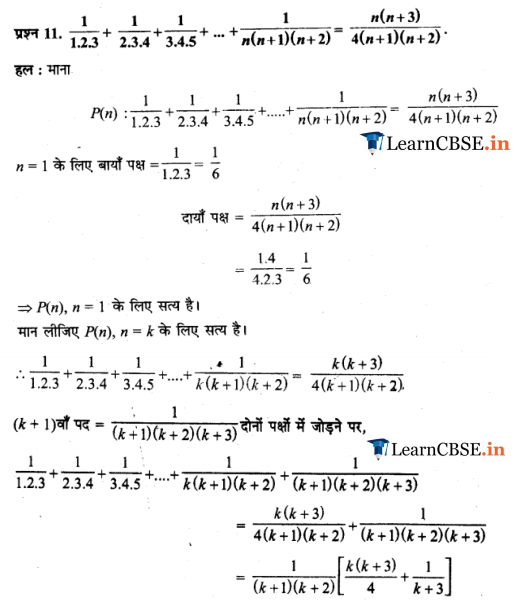
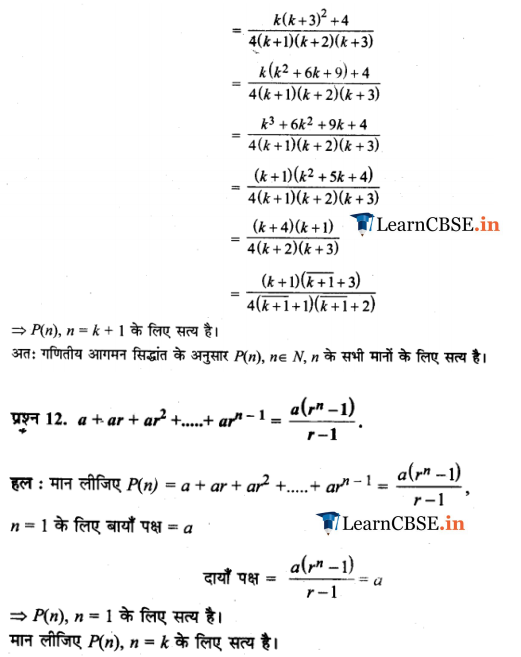
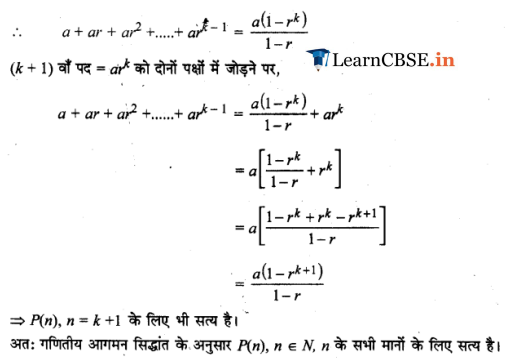
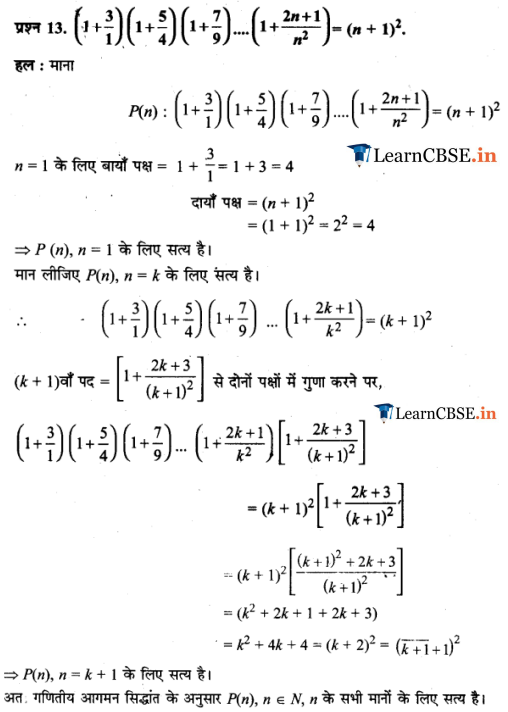
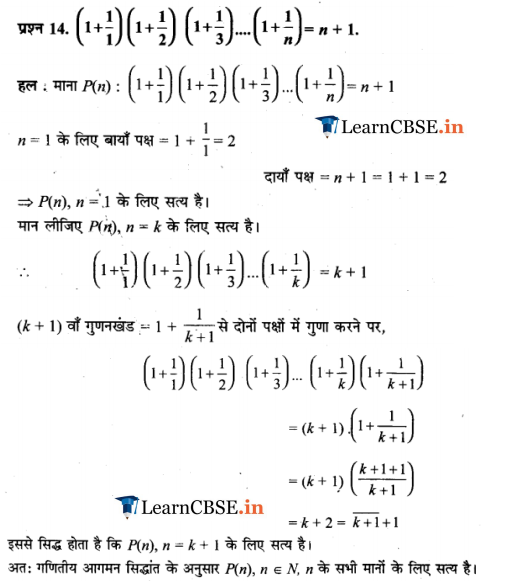
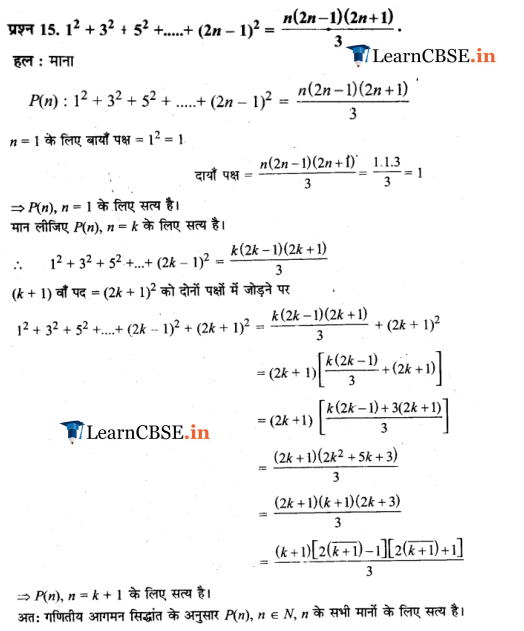
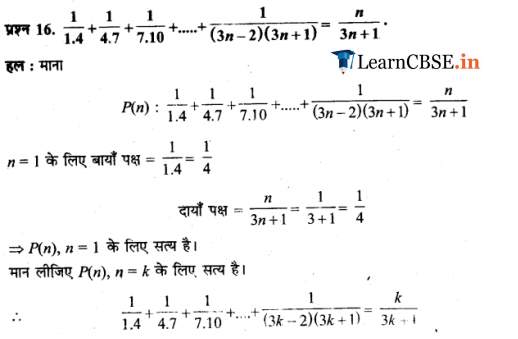
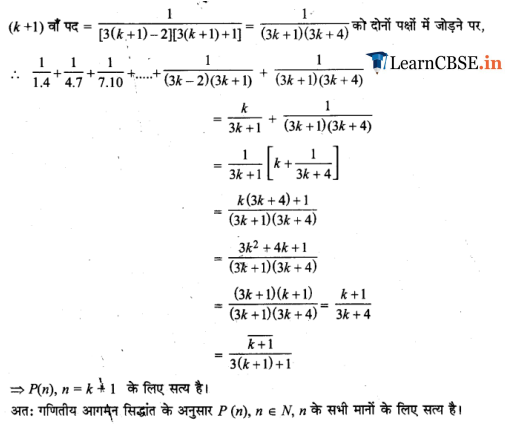
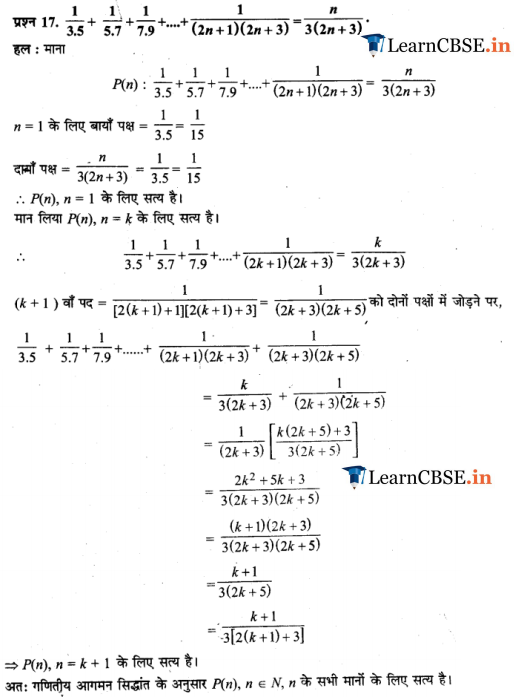
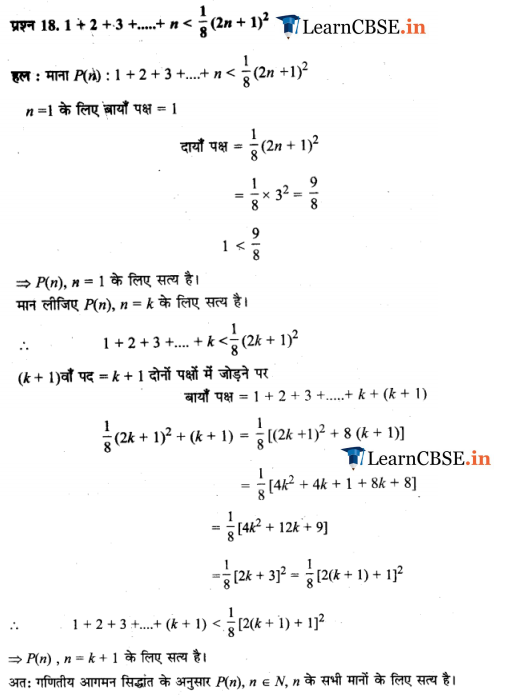
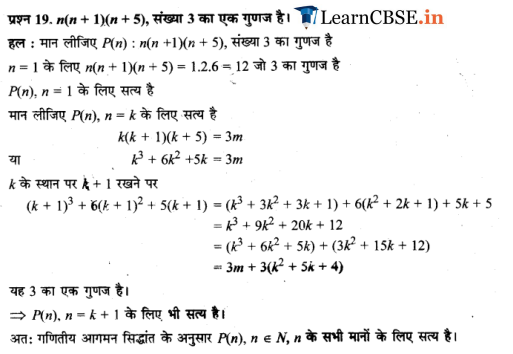
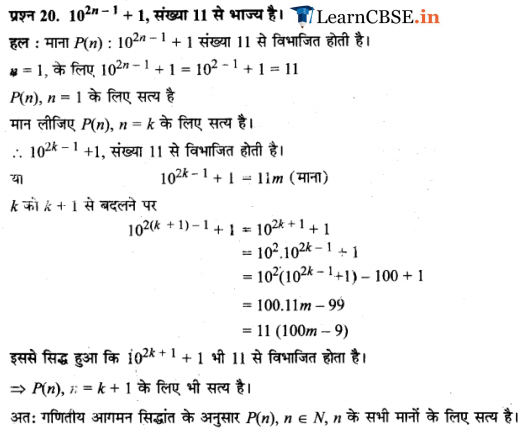
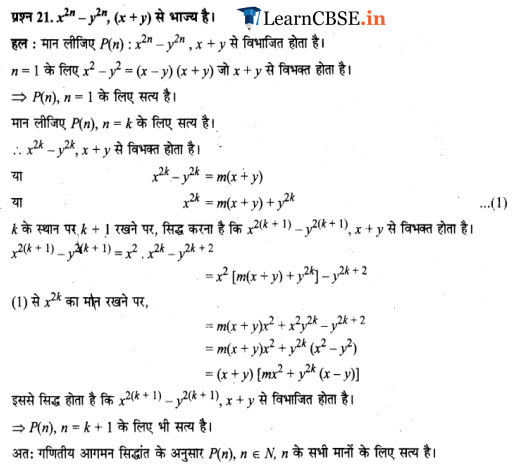
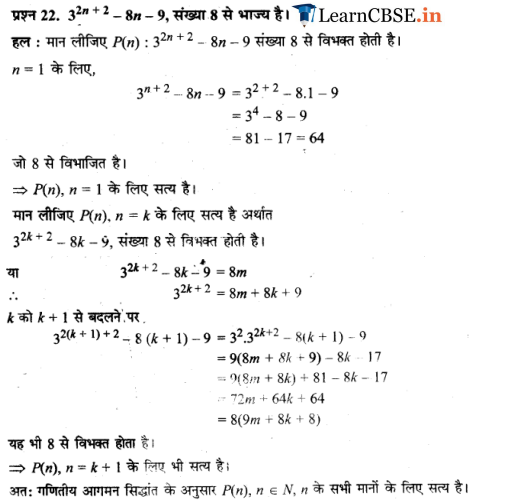
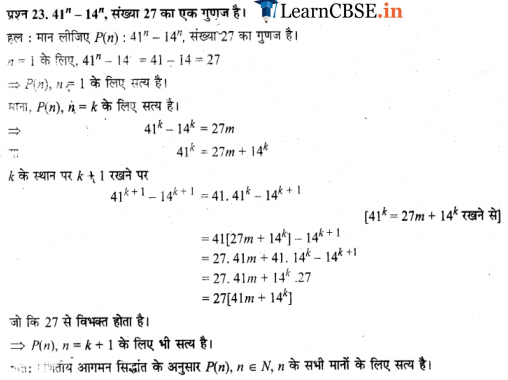
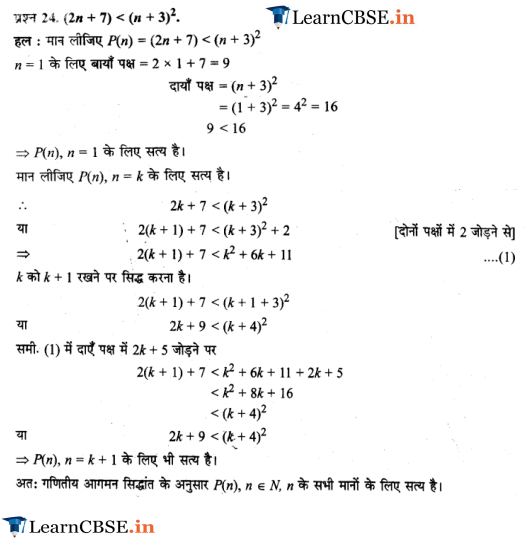
NCERT Solutions for Class 11 Maths All Chapters
- Chapter 1 Sets
- Chapter 2 Relations and Functions
- Chapter 3 Trigonometric Functions
- Chapter 4 Principle of Mathematical Induction
- Chapter 5 Complex Numbers and Quadratic Equations
- Chapter 6 Linear Inequalities
- Chapter 7 Permutation and Combinations
- Chapter 8 Binomial Theorem
- Chapter 9 Sequences and Series
- Chapter 10 Straight Lines
- Chapter 11 Conic Sections
- Chapter 12 Introduction to Three Dimensional Geometry
- Chapter 13 Limits and Derivatives
- Chapter 14 Mathematical Reasoning
- Chapter 15 Statistics
- Chapter 16 Probability